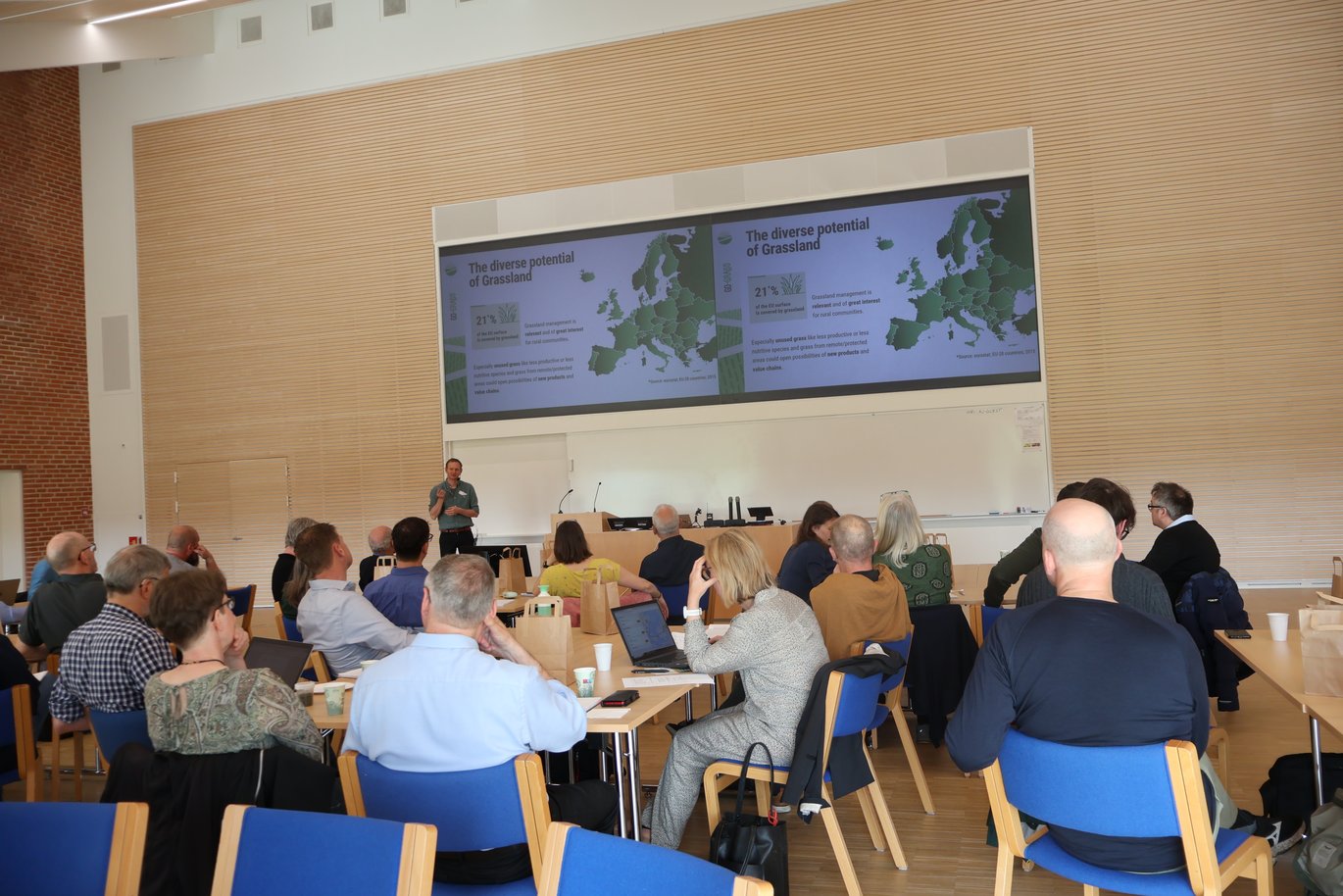“Cross-disciplinary collaboration is the key to promote circular bioeconomy in Europe”
Green biorefining can turn into solid business cases with several climate benefits. Aarhus University's Centre for Circular Bioeconomy, CBIO, has held a project conference that initiated a European research network in green biorefining, which will promote the development and dissemination of production in Europe.

Seven countries were represented when Aarhus University's Centre for Circular Bioeconomy (CBIO), in relation with the EU-project GO-GRASS, held a conference on green biorefining in AU Viborg, Foulum, in May. Among the 35 participants were researchers, consultants, and representatives from government agencies, and over two days they discussed and shared knowledge about green biorefining and circular bioeconomy across Europe.
GO-GRASS is a four-year EU-funded project, which started in 2019 and has 22 partners spread over eight countries. In four of the countries, Germany, the Netherlands, Sweden and Denmark, there are biorefineries on a demonstration scale, which process grass for different primary products; bio coal, paper and packaging, litter and organic feed proteins in Denmark. The side streams, the remaining biomasses, from the different processes are made for value-creating products such as fertilizers, feed, biomaterial, and bioenergy.
Many high-value products can be produced by grass
The motivation for the cross-regional GO-GRASS project came from the large untapped grassland, which has great potential in biorefining. Approximately 21 pct. of Europe consists of grassland, some of which are used for feed and bioenergy, but as grass is used now, it is financially not good business cases; but it can be, if the biorefining process is optimized to create higher yields and protein quality for feed and food products, as well as high-value products of side currents such as biomaterials and bioenergy. This means that existing biomass, which would otherwise have been wasted, is used as resources.
Biorefining is an essential form of production in circular bioeconomy, where it is the idea that biomass must be included in a production cycle with maximum utilization of its resources and with minimal waste.
Denmark and other European countries import large amounts of soy protein, which is used for feed; for Denmark, it is approximately 1 million tons. The imports, which mainly come from South America and the USA, are very climate-damaging with their CO2- emissions, but centralized European productions will be able to independently import and reduce CO2- emissions considerably.
A new European network with political impact
Here in the end year of the GO-GRASS project, the Danish project partner, Aarhus University's Centre for Circular Bioeconomy (CBIO), the conference was hosted by head of center Morten Ambye-Jensen, who also conducts research into Green Biorefining Technologies at Aarhus University. The program included a demonstration of the biorefinery in AU Viborg, Foulum, presentations and group discussions. The focus was on bringing experiences to the table and discussing the necessary measures to strengthen the research, so biorefining can gain a foothold as a production.
"There is great potential in utilizing grassland as a local source of protein for feed and food, but also for other products in the value chain – such as packaging, textiles, building materials, biofertilizer and bioenergy. We are just getting started in Denmark, but there is so much more to do. Here, cross-disciplinary collaborations are key to promoting green biorefining and circular bioeconomy in Europe," said Morten Ambye-Jensen at the conference.
With the large perspective and potential that the European GO-GRASS project has shown so far, there was great interest in continuing the collaboration among the participants. Therefore, it was decided to establish a European research network in green biorefining. Denmark, Norway, the Netherlands, Finland, Austria, Sweden, and Ireland are represented in the network, and the goal is to include more countries with activities within green biorefining.
The first network meeting has just been held, where there was a great deal of commitment and a lot of specific ideas for the future work of the network.
"With our European network, we can gather expert knowledge, where we can exchange ideas, questions and knowledge, because this is how we can strengthen our European perspectives. The network can also play an important role in communicating research-based knowledge to farmers, industry, and politicians around the EU. I'm sure that this network will have a political impact, and that our work can be a significant contribution to the EU’s climate neutrality goals in 2050," concludes Morten Ambye-Jensen.
GO-GRASS has received funding from the European Union's Horizon 2020 Research and Innovation program under grant Agreement No. 862674. It is a four-year project with completion in 2023.
The conference was organized in collaboration with Prospex Institute and Food & Bio Cluster Denmark.
Get more information about GO-GRASS
Read about CBIO
